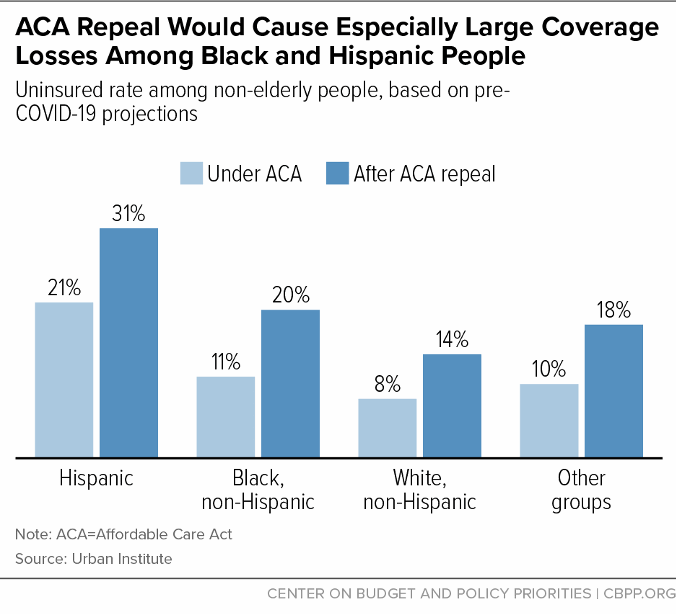Commentary: ACA Repeal Even More Dangerous During Pandemic and Economic Crisis
End Notes
[1] “Suit Challenging ACA Legally Suspect but Threatens Loss of Coverage for Tens of Millions,” CBPP, updated August 21, 2020, https://www.cbpp.org/research/health/suit-challenging-aca-legally-suspect-but-threatens-loss-of-coverage-for-tens-of.
[2] President Trump, September 27, 2020, https://twitter.com/realDonaldTrump/status/1310219962024439808.
[3] Amy Goldstein and Alice Crites, “Judge Barrett’s writing criticizes the Supreme Court decision upholding Obama-era health law,” Washington Post, September 28, 2020, https://www.washingtonpost.com/health/judge-barrett-aca-health-care-law/2020/09/28/429d165e-ff4c-11ea-b555-4d71a9254f4b_story.html.
[4] Congressional Budget Office, “An Update to the Economic Outlook: 2020 to 2030,” July 2, 2020, https://www.cbo.gov/publication/56442 .
[5] Dylan Scott, “The new anti-Obamacare lawsuit heads to court today. Scholars think it’s ‘absurd,’” Vox, September 5, 2018, https://www.vox.com/policy-and-politics/2018/6/8/17441512/obamacare-lawsuit-texas-trump; Robert VerBruggen, “The New Obamacare,” National Review, January 28, 2019, https://www.nationalreview.com/magazine/2019/01/28/the-new-obamacare/; Justin Baragona, “GOP Sen. Lamar Alexander Says He’s ‘Disappointed’ in Trump’s Ongoing Obamacare Lawsuit,” Daily Beast, May 10, 2020, https://www.thedailybeast.com/gop-sen-lamar-alexander-says-hes-disappointed-in-trumps-continuing-obamacare-lawsuit; Senator Lamar Alexander, Press Release, “Alexander Statement on Texas Obamacare Court Case,” June 12, 2018, https://www.alexander.senate.gov/public/index.cfm/pressreleases?ID=5AA8743C-F4FD-46A4-B282-0DE797E79ED4.
[6] Devlin Barrett and Matt Zapotosky, “Senior Justice Dept. lawyer resigns after shift on Obamacare,” Washington Post, June 12, 2018, https://www.washingtonpost.com/world/national-security/senior-justice-dept-lawyer-resigns-after-shift-on-obamacare/2018/06/12/b3001d7c-6e55-11e8-afd5-778aca903bbe_story.html.
[7] Editorial Board, “Texas ObamaCare Blunder,” Wall Street Journal, December 16, 2018, https://www.wsj.com/articles/texas-obamacare-blunder-11544996418; VerBruggen, Scott, op. cit.
[8] See the Supreme Court docket at https://www.supremecourt.gov/search.aspx?filename=/docket/docketfiles/html/public/19-840.html. CBPP also joined a brief on the devastating consequences of repeal at https://www.supremecourt.gov/DocketPDF/19/19-840/143451/20200513142138930_Nos.%2019-840.19-1019tsacFamiliesUSA.pdf.
[9] Jessica Banthin et al., “Implications of the Fifth Circuit Court Decision in Texas v. United States,” Urban Institute, December 2019, https://www.urban.org/sites/default/files/publication/101361/implications_of_the_fifth_circuit_court_decision_in_texas_v_united_states_final_121919_v2.pdf.
[10] Matt Broaddus, “Medicaid Enrollment Continues to Rise,” CBPP, September 9, 2020, https://www.cbpp.org/blog/medicaid-enrollment-continues-to-rise.
[11] Congressional Budget Office, “Federal Subsidies for Health Insurance Coverage for People Under 65: 2020 to 2030,” September 29, 2020, https://www.cbo.gov/publication/56571.
[12] Rachel Schwab, Justin Giovannelli, and Kevin Lucia, “During the COVID-19 Crisis, State Health Insurance Marketplaces Are Working to Enroll the Uninsured,” Commonwealth Fund, May 19, 2020, https://www.commonwealthfund.org/blog/2020/during-covid-19-crisis-state-health-insurance-marketplaces-are-working-enroll-uninsured.
[13] Mathieu Despard et al., “COVID-19 job and income loss leading to more hunger and financial hardship,” Brookings Institution, July 13, 2020, https://www.brookings.edu/blog/up-front/2020/07/13/covid-19-job-and-income-loss-leading-to-more-hunger-and-financial-hardship/.
[14] CBPP, “Chart Book: Accomplishments of the Affordable Care Act,” March 19, 2019, https://www.cbpp.org/research/health/chart-book-accomplishments-of-affordable-care-act; Sarah Miller et al., “Medicaid and Mortality: New Evidence from Linked Survey and Administrative Data,” NBER Working Paper No. 26081, August 2019, https://www.nber.org/papers/w26081; Jacob Goldin, Ithai Z. Lurie, and Janet McCubbin, “Health Insurance and Mortality: Experimental Evidence from Taxpayer Outreach,” NBER Working Paper No. 26533, December 2019, https://www.nber.org/papers/w26533.
[15] Jesse C. Baumgartner et al., “How the Affordable Care Act Has Narrowed Racial and Ethnic Disparities in Access to Health Care,” Commonwealth Fund, January 16, 2020, https://www.commonwealthfund.org/publications/2020/jan/how-ACA-narrowed-racial-ethnic-disparities-access.
[16] CBPP calculations from National Health Interview Survey data available from https://www.cdc.gov/nchs/nhis/healthinsurancecoverage.htm and https://www.cdc.gov/nchs/nhis/erkeyindicators.htm.
[17] For a discussion of how economic gaps are already widening, see LaDonna Pavetti and Peggy Bailey, “Boost the Safety Net to Help People with Fewest Resources Pay for Basics During the Crisis,” CBPP, April 29, 2020, https://www.cbpp.org/research/poverty-and-inequality/boost-the-safety-net-to-help-people-with-fewest-resources-pay-for?.
[18] Karen Pollitz, Jennifer Kates, and Josh Michaud, “Is COVID-19 a Pre-Existing Condition? What Could Happen if the ACA is Overturned,” Kaiser Family Foundation, September 30, 2020, https://www.kff.org/policy-watch/is-covid-19-a-pre-existing-condition-what-could-happen-if-the-aca-is-overturned/.
[19] Stephanie Armour, “For Many Pandemic Victims, Lingering Effects Stress Insurance Coverage,” Wall Street Journal, August 25, 2020, https://www.wsj.com/articles/for-many-pandemic-victims-lingering-effects-stress-insurance-coverage-11598347801.
[20] See, for example, Lisa Du, “Virus Survivors Could Suffer Severe Health Effects for Years,” Bloomberg, May 12, 2020, https://www.bloomberg.com/news/articles/2020-05-12/covid-19-s-health-effects-can-last-long-after-virus-is-gone.
[21] Matt Broaddus, “ACA Medicaid Expansion Drove Large Drop in Uncompensated Care,” CBPP, November 6, 2019, https://www.cbpp.org/blog/aca-medicaid-expansion-drove-large-drop-in-uncompensated-care.
[22] Tina Reed, “April was ‘worst month ever’ for hospital finances: report,” Fierce Healthcare, May 21, 2020, https://www.fiercehealthcare.com/hospitals-health-systems/april-was-worst-month-ever-for-hospital-finances-report# ; Kirk Johnson and Abby Goodnough, “Just When They’re Needed Most, Clinics for the Poor Face Drastic Cutbacks,” New York Times, April 4, 2020, https://www.nytimes.com/2020/04/04/us/coronavirus-community-clinics-seattle.html; Diane Arnos and Fredric Blavin, “To Weather COVID-19, Rural Hospitals Might Need More Support,” Urban Institute, April 6, 2020, https://www.urban.org/urban-wire/weather-covid-19-rural-hospitals-might-need-more-support;
[23] Margot Sanger-Katz, “The New Obamacare Lawsuit Could Undo Far More Than Protections for Pre-existing Conditions,” New York Times, June 12, 2018, https://www.nytimes.com/2018/06/12/upshot/the-new-obamacare-lawsuit-could-undo-far-more-than-protections-for-pre-existing-conditions.html.


